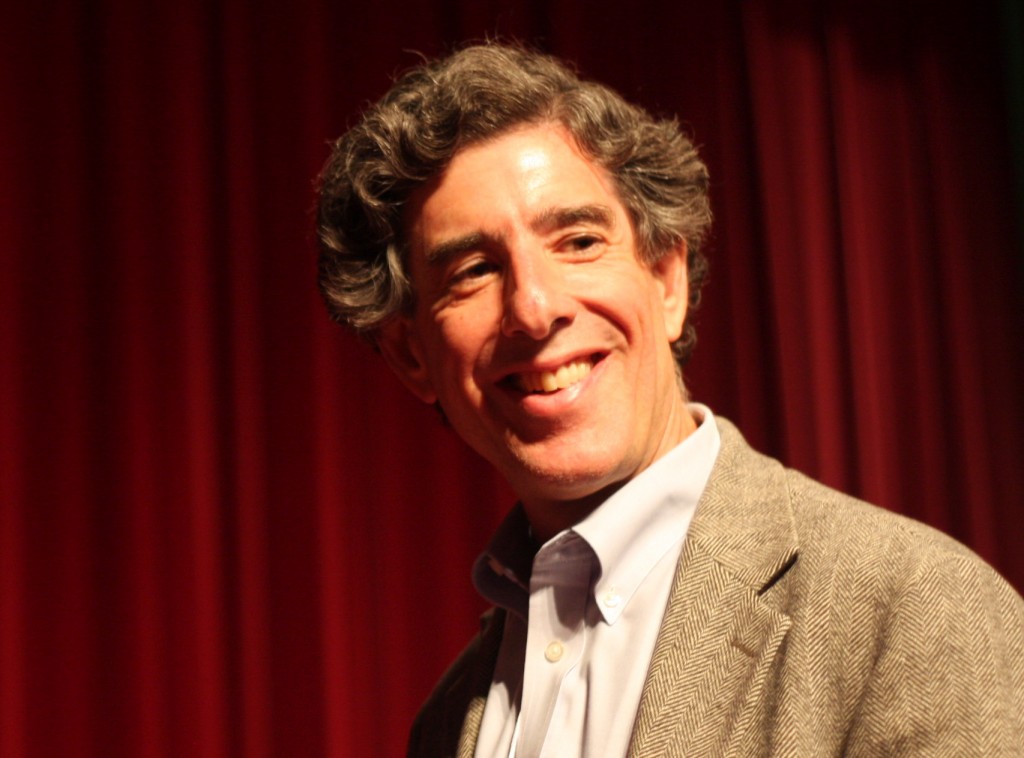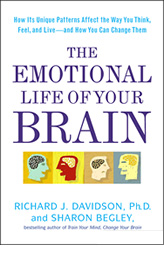16 Apr Finding Happiness with Richard Davidson – The Joy Trip Project

Happiness is one of those aspects of the human experience that’s hard to define. But scientist Richard Davidson has made it his life’s work to study exactly what it means to be happy. Founder and chair of the Center for Investigating Healthy Minds at the University of Wisconsin, Madison Davidson uses the scientific method to explore the human brain in order to discover how people experience and cultivate their sense of well being.
Before speaking at the 6th annal Earth Day Conference hosted by the UW Nelson Institute for Environmental Studies Davidson kindly shared a few thoughts on his research on happiness and the subject of his latest book “The Emotional life of your Brain”
JTP:
It’s sounds to me that a lot of what you do delves into the science of human behavior as it pertains to the mind. How does your work quantify or calculate something as esoteric as happiness?
Davidson:
I work to find the differences among people in how they respond to life’s slings and arrows. That’s also the focus of my book. I’m interested in the brain mechanisms that underlie those difference. And part of what we’re interested in figuring out how we can cultivate well-being and happiness and how that kind of cultivation can impact the brain and the body.
JTP:
As a scientist, what made you decide to look at this particular aspect of the human brain?
Davidson:
Well, emotion is something that has always fascinated me because when I began my career it was very understudied and not in the mainstream of scientific research. It also occurred to me that emotion is so central to everything that was important in human behavior. Differences of people in their emotional makeup was critical for understanding personality, understanding vulnerability to different types of disorders and also for understanding well-being and how resilience can be achieved and maintained. So those were all issues that captivated me when I first began my career and continue to occupy my attention at this day.
JTP:
So based on your research, how much of our happiness is a product of biochemistry?
Davidson:
I don’t think that’s the right way to ask the question, because you could say that 100 percent of happiness is caused in our brains. And 100 percent is also caused by our experience. From where I sit I make a distinction between the two. Brains are embedded in environment and culture and one of the central thrusts of my work is on neural plasticity, the idea that the brain is shaped by experience and by training. So when a layperson asks that question typically you’re thinking that anything that relates to biochemistry is not subject to the environment or can’t be modified by experience. It’s really precisely the opposite. We now know that the detailed molecular and also macro structure of the brain is continuously being shaped by experience.
JTP:
So if I understand you correctly, happiness is a product within our own minds of how we deal with the things that happen to us every day?
Davidson:
Yeah. Now there’s no question that certain genetic propensities provide some broad constraints. But within those broad constraints there’s a huge amount that each of us does that will influence our level of happiness and well-being. These days I talk about happiness and well-being as being skills. And we don’t normally think of them as skills, but there’s fundamentally no difference between well-being and learning to play a musical instrument. If you practice you’ll get better. All of my work is pointing in that direction.
JTP:
That anticipates my next question. What can we do to improve the quality of happiness in our lives? Apparently from what you just said there are skills that one can acquire. Can you give me some examples of what a person can do to be happy?
Davidson:
Most of the skills that we investigate come from some ancient contemplative practices that have been around for thousands of years. Simple mediation techniques can be used to alter how we respond to life’s slings and arrows. We can change the way we respond to stressful life events through simple mindfulness meditation. We can improve our capacity to sustain positive emotions through meditation practices that are explicitly designed to enhance our loving kindness and our compassion. Those are all simple exercises that can be presented in a completely secular way that our research has found to both alter the brain and behavior.
JTP:
You say ‘simple’. But I imagine there are those who would disagree with you. If it were so simple, wouldn’t everyone do it?
Davidson:
I actually do think it’s simple. It’s kind of like physical exercise. Today, most middleclass people in western countries certainly would agree that physical exercise is good for their health. And actually a good percentage of the population has incorporated physical activity into their weekly routine. There’s nothing really complicated about that and most people who do this understand that if they want to enjoy the health benefits of they need to practice. It’s the same for mental exercise.
Being mindful of your breathing is about the simplest practice that one can possibly imagine. People think it may be difficult because they haven’t done it before. They may have a difficult time actually doing it on a daily basis. But in the 1950s there were very few people engaged in the regular activity of physical exercise. I think it will just take a generational shift, but it’s my conjecture that in less than 50 years from now, mental exercise will be practiced in the same way that physical exercise is practiced today.
JTP:
So being mindful of your breathing is a good place to start. What do you do while you’re thinking about your breathing?
Davidson:
The first thing is you’re not thinking about your breathing. You’re just attending to your breathing. That’s very different than thinking about it. The invitation is not to create any thoughts about it, but simply to be aware, to be aware of what is. We’re continuously breathing. It’s going on whether we are conscious of it or not. The invitation is simply to show up and pay attention and notice what’s going on. And that’s it. As the mind becomes distracted and we become aware that we’re distracted we can return to our awareness and be mindful of what’s going on in that present moment.
According to recent data that’s been collected the average American spends 47 percent of his or her waking time not paying attention to what they’re doing. That is, mind-wandering. In my view that is not an obligatory property of our minds and brains. But that’s just a product of the cultures in which we live and it doesn’t have to be that way. He can actually show up and pay more attention if we cultivated more positive habits and minds, particularly early in life when the brain is much more susceptible to training.
JTP:
We live in a very results-oriented society. Is there any way to know whether or not you’ve been successful at mindfulness?
Davidson:
I think that there is. You can know it when you feel it. I think that when you are aware in that way it’s something that is self identifiable so that you know it when you are there. And when you become aware that your mind is elsewhere, in that moment when you come back that is a moment of awareness and an opportunity. That’s something that can be learned. People can get better at it. But the process of doing it is what’s important, not necessarily the results that you might achieve.
JTP:
That sounds to me not unlike an act of faith.
Davidson:
No, it’s very different than an act of faith. It’s totally different. There’s no faith involved. It’s very empirical. It’s just noticing what is there. Faith has nothing to do with this whatsoever.
JTP:
I suppose the reason I’m going there is that you let me know that you’ll know it when you see it. And that implies having no real expectation or understanding of what will happen. So you put yourself in that state of mindfulness hoping for a preferable outcome. Shouldn’t that imply that you need a certain amount of faith that something will happen?
Davidson:
No, I think it’s a matter of trying it. And if you find benefit in it than you can keep doing it. No faith is needed. It’s kind of like physical exercise. You don’t need any faith for that. You just start doing it. Then if you notice any benefits that will give you the motivation to continue doing it. There’s no faith required.
JTP:
Then what happens if nothing happens?
Davidson:
Then you might find that this is not a particularly good path for you. I think it’s important for anyone who does try this gives it a serious try, and take a sufficient amount of time working with it before they decide to give up. Many people try physical exercise and give up too early. I think it’s very similar. But at the same time I don’t think this is a practice for everybody. There are other things that one can do to help promote well being that has nothing to do with this kind of practice. And if a person finds that this is not the right path for them they should explore others. One size just does not fit all.
JTP:
If you were to give a person a single piece of advice with regard to how they would be a little happier today what would you suggest for them?
Davidson:
Well the first thing I would suggest to them is that it is possible to change. One’s current level of well being or happiness does not necessarily imply that that’s where a person is stuck. It is possible to change. I would encourage anyone who wants to change to explore all kinds or routes and to find one that seems best for them. In the last chapter of my book I talk about a lot of techniques and practices that one can do, only some of which come from a mediation tradition. Others come from western psychology and others from common sense.
The Joy Trip Project is made possible with the support of sponsors Patagonia, Rayovac and The Nelson Institute for Environmental Studies
![]()
![]()
![]()




You must be logged in to post a comment.